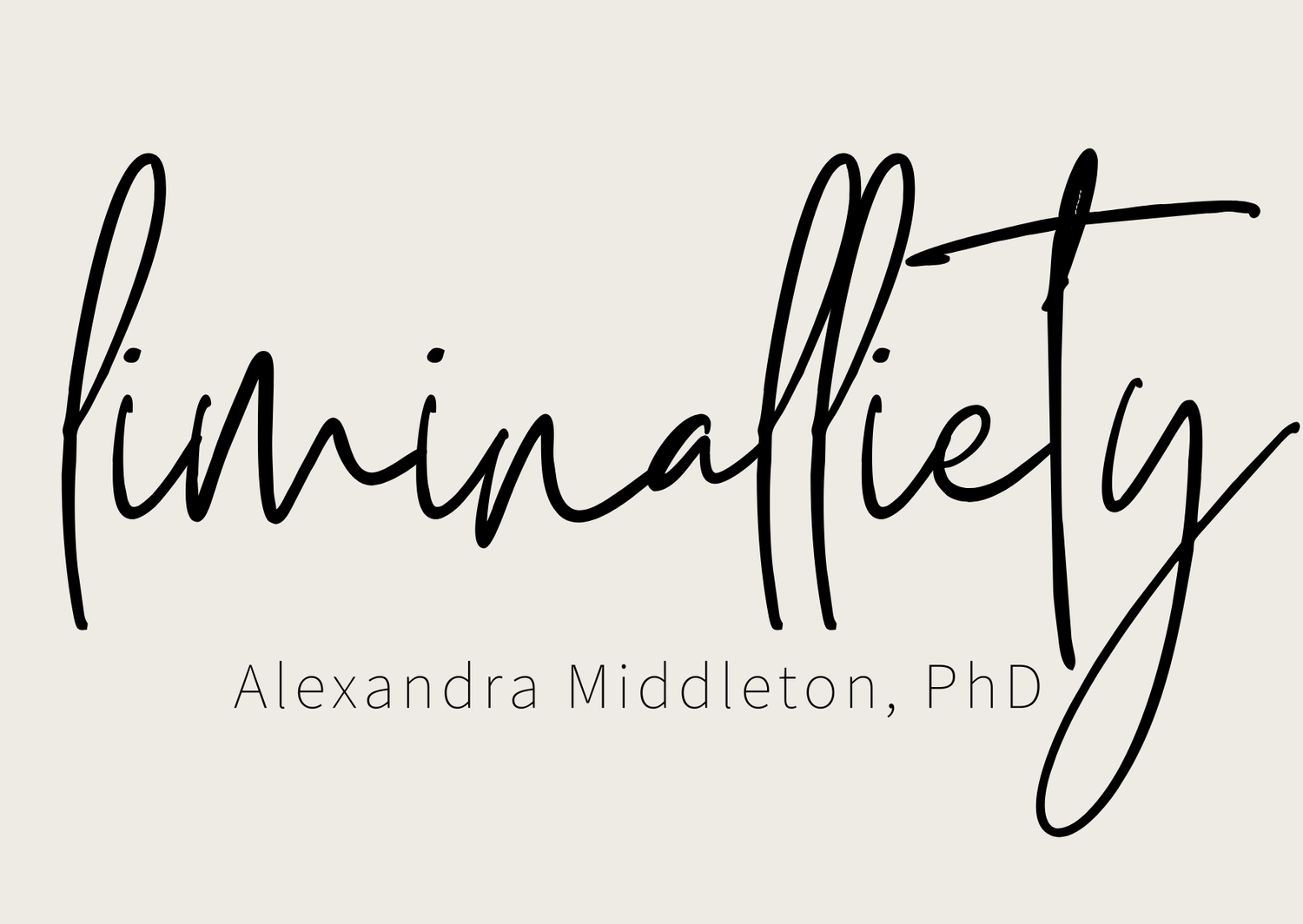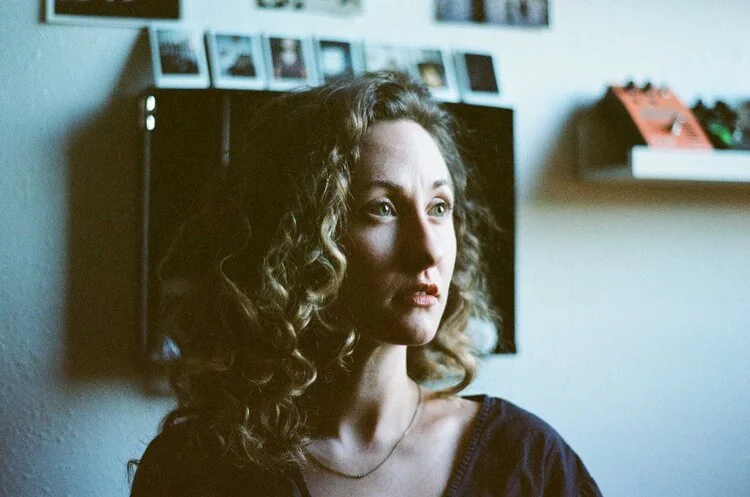Corinne Sharlet :: Creativity as Psychic Survival
“I think we’re all craving art that feels more human than machine,” Portland-based singer-songwriter and therapist Corinne Sharlet says of the importance of embracing imperfection in art-making, “more cracks in the voice, more wrong notes.” Her voice, both in its acoustic range and depth as well as in its storytelling, is undeniably distinct — ethereal and grounded at once, milk-and-honey-meets-thistle, haunting and enchanting (this is where you definitely want to pause and go have a listen yourself, before or while reading this!).
Corinne’s debut album A Lovely Future, which was released earlier in 2021, speaks directly to the kinds of Covid-era questions we collectively face, inviting paradox in to the imagining of an uncertain future (even as most of the songs were written prior to the pandemic). Recorded on analog tape to resemble the kind of live performances missing during the pandemic, the album is a soundscape in which Corinne engages creative redefinition and a reckoning with perfectionism.
In addition to her musical career, Corinne is also a psychotherapist trained in Voice Movement Therapy, an art therapy modality using voice to help people heal from trauma. This modality has offered Corinne a chance to merge her interests in art and therapy, parts of herself she previously felt needed to be kept separate.
I recently got the chance to catch up with Corinne, who is also a longtime friend of mine (we both grew up in the same high-desert town of Bend, Oregon and also worked together for a short time hosting and waiting tables at Deschutes Brewery in Portland). Below, we talk about breaking up with perfectionism, disentangling identity from one’s creative work, redefining success as an artist, letting go of childhood dreams to make space for new ones, and so much more. It’s an incredibly rich and expanding conversation—join us!
Photo Credit: Ryan Oxford
You speak about creativity as “psychic survival." What does this phrase mean to you, in the context of your life, work, and art?
Creativity and expression are essential to my mental health and developing a vibrant life. I wrote the phrase “creativity is psychic survival” as a sort of personal declaration and reminder for myself when I begin to lose sight of why I make music, but also as a way to describe the focus of my work as a psychotherapist. I believe that all humans are born with the right to creatively express themselves and it is through making art that we can translate the truth of our inner world and express ourselves in a language that we are all born understanding.
Speaking of life/work/art, your work life has spanned so many iterations beyond singing/songwriting, into psychotherapy, Voice Movement therapy, and waiting tables. Many artists face this question of whether (and how) to make one's artistic passion into a career, or how to architect one's life so that it is possible to make art sustainably. How have you navigated this landscape of calling/vocation/career/passion/job over the past few years? Where are you now with it?
“WHAT I HADN’T YET REALIZED IS THAT ‘FINDING MY TRUE SELF’ MEANT RECOGNIZING THAT I HAVE MANY DIFFERENT SELVES WHICH ARE ALL A PART OF MY ‘TRUE SELF,’ AND THESE SELVES RARELY FEEL IN BALANCE.”
I struggle all the time between the tension of my two main passions in life, singing/songwriting and psychotherapy. I used to think that in order to be a successful artist I had to give up having a professional career as a therapist. I tried very desperately to try and fit myself into one identity or the other because I thought by doing so, I would find “my true self”. What I hadn’t yet realized is that “finding my true self” meant recognizing that I have many different selves which are all a part of my “true self”, and these selves rarely feel in balance (I think “finding balance” is an unrealistic expectation of ourselves). Finding the expressive art therapy technique, Voice Movement Therapy, which I now use with my therapy clients, transformed how I view myself as a psychotherapist and gave me the permission I guess I was needing to use my artist self in all that I do. I have found that by allowing myself to embrace both parts of myself actually makes me a better artist and therapist. This shift did require me to redefine what success as an artist means to me. I have had to do a lot of work around grieving the loss of my childhood dream of being a famous singer to allow for this new dream, one that is truly satisfying for me and supportive of my lifestyle, to come to fruition.
You write about your lifelong grapple with perfectionism and performance, and you and I have had many conversations over the years about perfectionism and creativity. You seem to have recently located an approach to your music that embraces imperfection, finding beauty in "more cracks in the voice, more wrong notes." How did you get here? And how do you (re)commit to embracing imperfection when perfectionism inevitably lures?
“JUST KEEP DOING IT, KEEP MAKING STUFF – WHAT WE MAKE IS NOT SO PRECIOUS.”
I think I will always struggle with perfectionism. It makes me overthink everything especially when it comes to sharing on social media. It has been necessary for me to stare at my perfectionism in the face and recognize that it comes from my fear. When I can dive underneath the perfectionism to acknowledge the fear then I can work through it. A phrase that I often have to say to myself is, “my music is not a reflection of my value as a human”. When my self-worth becomes intertwined with how my music sounds, how proud of it I am or whether it is received well, that means trouble. I had a professor in undergrad tell my class once that “ideas are cheap”. By saying “ideas are cheap” he was trying to encourage us not to get too hung up on one creative decision but rather to just keep doing it, keep making stuff – what we make is not so precious. Focusing on the process over product and viewing my work as less precious allows me to move through perfectionism.
You spent much of the pandemic finishing and producing your debut album, A Lovely Future. How has the pandemic influenced your creative process and your art?
After a lot of warring in my mind I came to realize that I could find a way to record my album safely (socially distanced) and that this was the exact moment that I needed music to focus on and move through the discomfort and fear of Covid. Thankfully I had most of the material written before quarantine fully set in because the pandemic significantly stifled my ability to write music. Being in quarantine taught me that my inspiration for writing songs most often comes from being outside, traveling and overall finding beauty in the world, which for the most part was non-existent last year. Before the pandemic hit, I was already feeling unsure how I wanted music to play a role in my life. The pandemic forced me to ask some hard but necessary questions about what success with my music looks like. Once I was able to settle into knowing that I don’t want my career or to be solely performing and writing music but rather in addition to being a therapist, I felt much more relaxed and creative.
On this concept of "A Lovely Future," I'm so intrigued about how "the future" figures into your art in a time when we face so much social, biological, and planetary uncertainty. What is your hope for the future role of art/songwriting/music-making as we emerge from the pandemic?
“ART IS AN INCREDIBLE WAY TO INSPIRE AND GENERATE HOPE BY SHOWING PEOPLE NEW WAYS THE WORLD COULD BE.”
We need art to push the boundaries of what we imagine is possible for the future. I believe there is “a lovely future” possible for us all and the possibilities are born from our imaginations. When we resign to the idea that “this is just the way things are and its always been this way so we are doomed” we rob ourselves of the chance to create new opportunities for action toward a just and hopeful future.
I am not saying that just “thinking positively” and sitting around “imagining” a different future will make it a reality, but rather that hope and inspiration is a stronger motivator than fear. Fear makes us paralyzed. Art is an incredible way to inspire and generate hope by showing people new ways the world could be. I think art/songwriting/music-making is more essential for our survival than it has ever been. It is times of great suffering, uncertainty and transformation that we need art most of all.
Can you tell us about a "liminal" moment or period that has defined you, your life, your identity, your work?
I think I am just now emerging on the other side of the most “liminal” period of my life. At the beginning of the pandemic I wasn’t sure if I wanted to continue pursuing my license as a mental health therapist or focus my energy on my artistic pursuits. I felt like I was suspended between two identities -- one as an artist and one as a therapist. When the pandemic hit I was pushed to re-enter my work in the mental health field because the service industry job I was working was no longer available. I was surprised at how good it felt to be back working as a therapist. When I worked as a therapist in the past I was not yet incorporating Voice Movement Therapy into my practice and I wasn’t engaged with my own creative process of making music so coming back to the mental health field in 2020 felt much different. My training in Voice Movement Therapy helped me find a way to merge my artist and therapist self in a satisfying and exciting way.
It is not lost on me that my ability to experience a career development during a global pandemic that has shattered so many lives, reflects the amount of privilege I have in my life. I want to use that privilege to create a more just, safe and supportive world for all people and I believe art is a vital part of making that hopeful future a reality.


